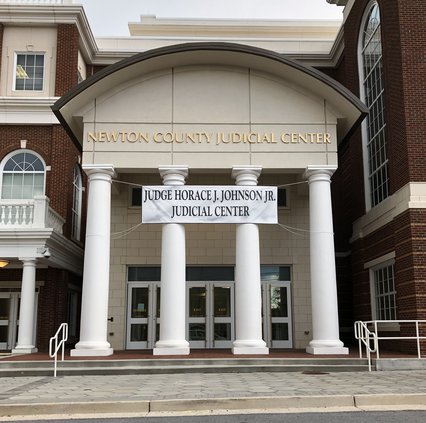COVINGTON, Ga. — Senior Judge David Sweat of Athens will hear a case asking a court to settle a dispute over thousands in back pay which may be owed to two top Newton County officials.
The Newton County government has filed a lawsuit in Superior Court in Covington against the county commission chairman and Probate Court judge and asks a judge to determine which of two methods should have been used to calculate their pay for the past four years.
The Alcovy Judicial Circuit’s four Superior Court judges Oct. 15 filed an order to recuse themselves and sent a notice to the administrator of the state’s 10th Judicial District to find a new judge to hear the case.
The new judge will schedule the case and determine if it should be conducted virtually or in-person, a district official said.
Newton County government is asking the court to rule the calculation the county has used for 26 years be used to calculate the salaries of the chairman and Probate Court judge since each took office in 2017.
Chairman Marcello Banes and Probate Judge Melanie Bell contend they are owed thousands in back pay.
Banes and Bell maintain they are owed about tens of thousands each in back pay because each official’s annual salary is less than what it should have been since they took office, according to current state law.
The chairman and judge said their salaries should have been calculated under a state law that uses the highest minimum annual salary of all constitutional officers in the county.
They contend the law states the highest minimum salary is calculated by adding base pay, local supplements, longevity pay and cost of living increases together.
The four are called constitutional officers because the state constitution specifies their duties and minimum salaries — both of which the county government does not directly control.
Local legislation approved for Newton County in 1994 followed state law in how it was to calculate salary for the county’s four constitutional officers, including the clerk of courts, sheriff, probate court judge and tax commissioner. It also included the chairman of the Board of Commissioners in its pay calculation.
The county says in its lawsuit its “custom and historical practice” follows the 1994 local law that does not include COLAs and longevity increases to calculate the highest minimum annual salary.
The longtime method was used to calculate Banes’ current pay of $101,000 annually and Bell at $103,000.
It says the method favored by Banes and Bell adds more to cost of living allowances (COLAs) than should be allowed.
The county references Clerk of Courts Linda Hays’ eight terms in office, and says the pay calculation favored by Banes and Bell gives longevity credit to constitutional officers even if they just took office.
“In other words, defendants’ calculation leads to absurdity manifestly not intended by the Legislature that the county clerk of court’s eight-term longevity increase should be applied” to the base salaries of Banes, Bell and all other officers even though neither of the two have completed their first term.
“Such practice would be duplicative and potentially award longevity increases to officers for unearned terms,” the suit states.
The county's action follows its plan to ask the Georgia General Assembly in 2021 to make changes to eliminate the differences between the county’s traditional calculation and state law for future salary payments.





